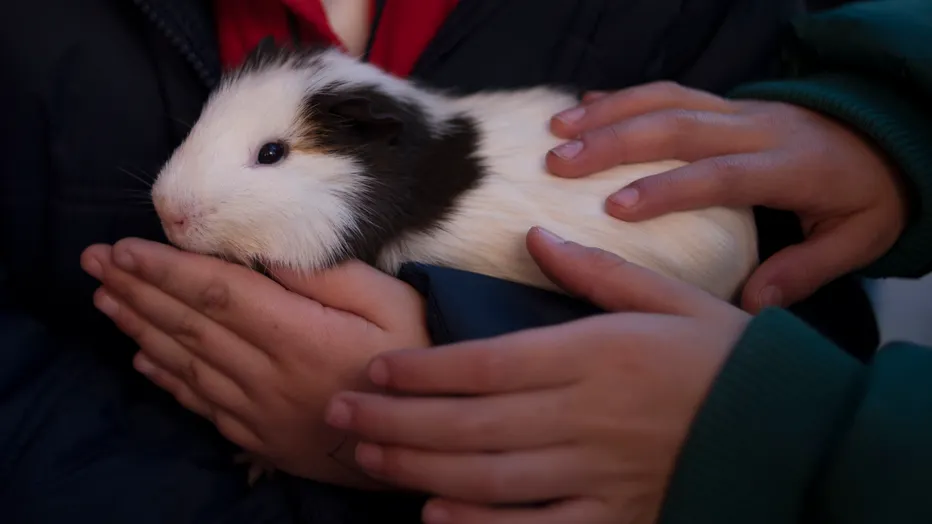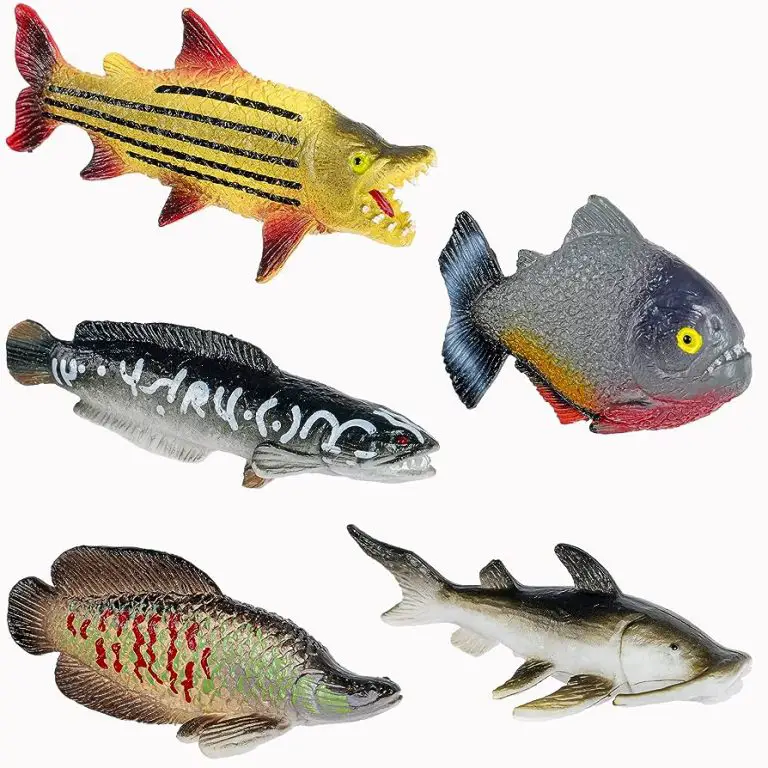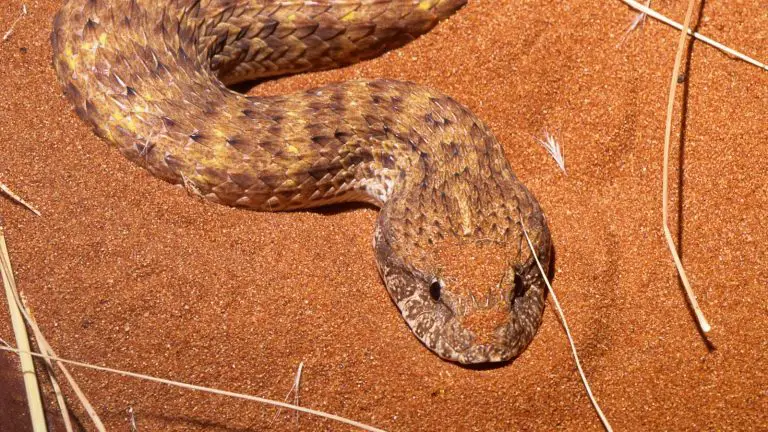Can Ants Be Deadly for Guinea Pigs?
Yes, ants can kill guinea pigs. In certain cases, certain species of ants can bite and inject venom into guinea pigs, leading to severe health complications or even death.
This article will explore the potential dangers that ants pose to guinea pigs and provide essential information for guinea pig owners to ensure their pets’ safety. Additionally, we will discuss preventive measures and treatment options in case of an ant infestation near guinea pig habitats.
Understanding the risks associated with ants can help protect these small and vulnerable animals from harm.
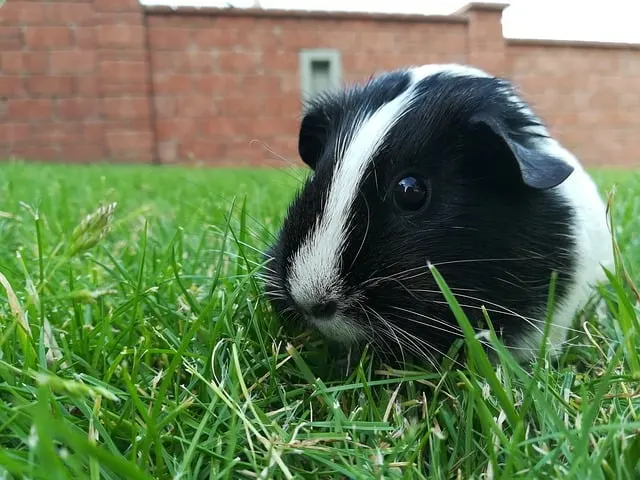
The Surprising Threat Of Ants To Guinea Pigs
Ants can pose a surprising threat to guinea pigs, as their bites can cause severe discomfort and even potential health risks. It is important for guinea pig owners to be aware of this issue and take necessary preventive measures to protect their pets from ant infestations.
Ants may seem harmless, but these tiny creatures can pose a surprising threat to guinea pigs. Here’s what you should know about the relationship between ants and guinea pigs, and how ants can become deadly for these small pets.
The Relationship Between Ants And Guinea Pigs:
- Invasion: Ants are naturally attracted to food sources, and guinea pig enclosures with leftover food or spilled pellets make for an enticing target.
- Prevalence: Ant infestations can occur both outdoors and indoors, and guinea pigs housed near ant colonies or with easy access to ants are particularly vulnerable.
How Ants Can Become Deadly For Guinea Pigs:
- Bites and Stings: Some ant species have painful bites or stings that can cause significant discomfort to guinea pigs. These bites and stings may lead to allergic reactions, skin irritation, and infection.
- Toxicity: Certain ants produce venom or release toxic substances when provoked. If a guinea pig ingests or comes into contact with these substances, it can result in poisoning and potentially be life-threatening.
- Stress and Panic: The presence of ants can stress guinea pigs, leading to panic, frantic movements, and unintended injuries. Highly sensitive guinea pigs may experience severe stress, which can negatively impact their overall health.
Guinea pig owners should be aware of these risks and take preventive measures to keep their pets safe. Regularly cleaning guinea pig enclosures, ensuring food spills are promptly addressed, and implementing ant control methods can help mitigate the threat of ants.
Additionally, seeking vet care immediately if a guinea pig is bitten or shows signs of distress is crucial.
Ants may be small, but they can pose a significant danger to guinea pigs. By understanding the relationship between ants and guinea pigs, as well as the ways in which ants can become deadly, you can better protect your beloved pets from these unexpected threats.
Stay vigilant, and prioritize the safety and well-being of your guinea pigs to ensure they live happy and healthy lives.
Understanding The Toxicity Of Ant Bites
Ant bites can be toxic and harmful to guinea pigs, but they usually do not have the capability to kill them. It is crucial for guinea pig owners to understand the potential toxicity of ant bites and take necessary precautions to keep their pets safe.
When it comes to tiny creatures like ants, it can be easy to underestimate the harm they can cause. However, it’s important to understand the toxicity of ant bites, especially when it comes to our beloved guinea pigs. These small rodents are susceptible to ant bites, and the venomous nature of these bites can have serious consequences for them.
Let’s delve into the reasons why guinea pigs are vulnerable and learn more about the venom that ants carry:
The Venomous Nature Of Ant Bites
Ants may be small, but their bites can pack a punch. Here’s what you should know about the venomous nature of ant bites:
- Multiple species, multiple toxins: There are several species of ants, and not all have the same level of toxicity. Some ants, like fire ants, have venom that can cause intense pain and allergic reactions, while others may have milder toxins. It’s essential to be aware of the type of ant lurking in your surroundings, as their venom can vary in potency.
- Chemical composition: Ant venom consists of a mixture of alkaloids, peptides, and proteins that are designed to immobilize and incapacitate their prey. These components can trigger allergic reactions in guinea pigs and cause various symptoms.
- Allergic reactions: Guinea pigs have delicate skin, making them more prone to allergic reactions when exposed to ant venom. Even a single bite can result in redness, swelling, itching, and discomfort for our furry friends. In severe cases, an anaphylactic reaction can occur, which may require immediate veterinary attention.
- Systemic effects: Apart from localized reactions, certain ant venom compounds have the potential to affect the guinea pig’s entire body. They can interfere with the central nervous system, cardiovascular system, and respiratory system, leading to serious health issues.
- Multiple bites can compound the problem: If a guinea pig is bitten repeatedly or swarmed by a significant number of ants, the cumulative venom can further exacerbate the effects. This can be particularly dangerous for smaller guinea pigs or those with weaker immune systems.
Now that we understand the venomous nature of ant bites, let’s explore why guinea pigs are particularly susceptible to these bites.
Unveiling The Hidden Dangers In Ant Nests
Discover the hidden dangers lurking in ant nests and how they can pose a threat to guinea pigs. Understand the facts behind whether ants can actually kill these small pets. Prepare yourself with the knowledge needed to keep your beloved guinea pigs safe.
Have you ever wondered about the potential dangers that ants could pose to your beloved guinea pigs? While ants may seem harmless at first glance, it’s important to understand that their nests can harbor hidden toxins that could harm your furry friends.
In this section, we will explore the toxic substances commonly found in ant nests and how guinea pigs can come into contact with these toxins.
Exploring The Toxic Substances Found In Ant Nests:
- Formic acid: Ants produce formic acid as a defense mechanism, which can be found in their nests. This toxic substance can cause irritation and discomfort if it comes into contact with a guinea pig’s skin or eyes.
- Pheromones: Ants release pheromones, chemical signals that communicate information within the ant colony. While not usually directly harmful, excessive exposure to pheromones can disrupt a guinea pig’s behavior and overall well-being.
- Fecal matter: Ant nests are often laden with fecal matter, which can contain bacteria and pathogens. If ingested, these contaminants can lead to gastrointestinal issues and other health problems in guinea pigs.
- Allergens: For some guinea pigs, ants and their nests can be a source of allergens that trigger allergic reactions. Symptoms may include itching, swelling, and respiratory distress.
How guinea pigs can come into contact with these toxins:
- Direct contact: Guinea pigs are naturally curious animals, and their inquisitive nature may lead them to investigate ant nests. They can come into direct contact with the toxins found in ant nests by stepping on or sniffing the ants, resulting in potential harm.
- Indirect contact: Even without direct interaction, guinea pigs may still be exposed to ant toxins. Ants can carry these substances on their bodies as they explore the surroundings, leaving traces of their toxins in the guinea pig’s environment. If the guinea pig comes into contact with these contaminated surfaces, it can still pose a risk.
- Ingestion: Guinea pigs may accidentally ingest ants or ant-contaminated food, water, or substrate. This can occur if the guinea pig wanders near or into an ant nest, unknowingly introducing the toxins into its system.
It is crucial to ensure the safety of your guinea pigs by taking preventative measures to minimize their contact with ants and their nests. Regularly inspect and clean their living areas, eliminate ant colonies near their habitats, and provide a safe and secure environment for them to thrive.
Remember, while ants may seem harmless, the toxins present in their nests can potentially harm guinea pigs. By understanding and mitigating these risks, you can help keep your furry companions safe and healthy.
The Shocking Symptoms Of Ant Bites On Guinea Pigs
Ant bites can cause shocking symptoms on guinea pigs, but can they kill them? Find out what you need to know about the potential dangers ants pose to guinea pigs.
Ant bites can be a cause for concern when it comes to guinea pigs. These tiny creatures may seem harmless, but their bites can have devastating effects on our furry friends. In this section, we will explore the shocking symptoms of ant bites on guinea pigs and discuss the potential health risks they pose.
Recognizing The Signs Of Ant Bites:
- Redness and swelling: Ant bites typically result in red, inflamed skin around the affected area. Keep an eye out for any signs of irritation or discomfort on your guinea pig’s body.
- Itching and scratching: Guinea pigs may incessantly scratch or bite at the site of the ant bite. This itching can be persistent and may lead to further skin irritation or even wounds.
- Agitation and restlessness: If your guinea pig has been bitten by ants, they may exhibit signs of agitation, restlessness, or discomfort. Watch for unusual behavior such as excessive grooming or changes in appetite.
- Formation of blisters or sores: In some cases, ant bites can lead to the development of blisters or sores on the guinea pig’s skin. These can be painful for the animal and may require veterinary attention.
- Loss of hair: Ant bites can sometimes cause hair loss in the affected area. If you notice patches of missing fur or bald spots, it could be a sign of ant bites.
Understanding The Potential Health Risks For Guinea Pigs:
- Allergic reactions: Guinea pigs may have allergic reactions to ant bites, which can vary in severity. Mild reactions may manifest as localized redness and swelling, while severe reactions can lead to breathing difficulties, hives, and even anaphylaxis. Immediate veterinary care is essential in such cases.
- Secondary infections: If ant bites cause open wounds or sores, there is a risk of secondary infections. Bacteria or other pathogens can enter through these openings, leading to further health complications for the guinea pig.
- Stress and emotional trauma: Guinea pigs that have been bitten by ants may experience significant stress and emotional trauma. This can impact their overall well-being, causing changes in behavior, appetite, and overall health.
It is crucial to recognize the signs of ant bites on guinea pigs and understand the potential health risks they pose. Monitoring your guinea pig’s well-being and seeking veterinary care if needed can help ensure their safety and prompt treatment.
Protecting Your Guinea Pig From Ant-Related Dangers
Guinea pigs are vulnerable to ant-related dangers, but understanding the risks can help you protect them. Learn about the potential harm ants can cause and take steps to keep your furry friend safe.
Ant infestations can pose a real threat to the safety and well-being of your beloved guinea pig. These tiny creatures are not only bothersome but can also harm your pet if not properly managed. To ensure the health and happiness of your guinea pig, it’s vital to take preventive measures to keep ants away from their habitat.
Here are some simple steps you can follow to protect your furry friend from ant-related dangers:
Simple Steps To Prevent Ant Infestations Near Your Guinea Pig’S Habitat:
- Keep the surroundings clean: Regularly clean the area around your guinea pig’s cage. Remove any leftover food, spilled water, or any other potential ant attractants. This will make the habitat less appealing to ants and discourage them from invading.
- Seal entry points: Inspect your guinea pig’s enclosure and ensure there are no cracks, gaps, or openings that ants can use to enter. Seal these entry points with caulk or other suitable materials to create a barrier preventing ants from infiltrating the habitat.
- Store food properly: Ants are primarily attracted to food sources. Store your guinea pig’s food in sealed containers that ants cannot access. Consider using ant-proof feeders inside the cage to minimize the risk of ant infestation.
- Create a moat: Placing your guinea pig’s cage on a platform or table legs immersed in water can act as a natural barrier against ants. Ants cannot swim, so this simple trick can effectively deter them from reaching the enclosure.
Effective Methods For Repelling Ants Without Harming Your Guinea Pig’S Health:
- Vinegar solution: Ants dislike the strong smell of vinegar. Mix equal parts vinegar and water in a spray bottle and apply it around the guinea pig’s habitat. Avoid spraying directly on your pet or any surfaces they come into contact with.
- Citrus peels: Ants are repelled by the scent of citrus. Place orange or lemon peels near the enclosure to discourage ants from approaching.
- Cinnamon: Sprinkle cinnamon around the guinea pig’s habitat, as ants find the scent unpleasant. Be cautious not to apply cinnamon directly to your pet or their bedding.
- Diatomaceous earth: This natural powder, composed of fossilized remains of diatoms, can be sprinkled around the cage to create a barrier against ants. However, make sure the guinea pig does not come into direct contact with it, as diatomaceous earth can be harmful when ingested.
- Peppermint oil: Mix a few drops of peppermint oil with water and spray it around the guinea pig’s enclosure. Ants dislike the strong scent of peppermint, making it an effective repellent.
By following these simple steps and utilizing natural ant-repelling methods, you can protect your guinea pig from ant-related dangers while maintaining a safe and comfortable living environment for your furry companion. Stay proactive and monitor your guinea pig’s habitat regularly to ensure their well-being.
Treating And Soothing Ant Bites On Guinea Pigs
Ants can pose a threat to guinea pigs, as their bites can cause discomfort and potential health issues. It’s important to promptly treat and soothe ant bites on guinea pigs to ensure their well-being and prevent further complications.
Ant bites can cause discomfort and irritation to your furry companion. While guinea pigs are not typically in danger of being killed by ants, it’s important to know how to effectively treat and soothe ant bites to ensure your pet’s well-being.
In this section, we will discuss safe and natural remedies to alleviate the discomfort of ant bites on guinea pigs, as well as when to seek veterinary assistance for severe reactions.
Safe And Natural Remedies To Alleviate The Discomfort Of Ant Bites:
- Applying a cold compress: Gently place a cold compress on the affected area to reduce swelling and provide relief to your guinea pig. This can be done by wrapping ice cubes in a cloth or using a pre-made cold pack. Be sure to hold the compress against the skin for a few minutes at a time.
- Aloe vera gel: The cooling properties of aloe vera gel can help soothe and heal ant bites. Apply a small amount of pure aloe vera gel to the affected area, making sure it is specifically designed for guinea pigs and does not contain any harmful additives.
- Chamomile tea compress: Brew a cup of chamomile tea and let it cool down. Gently dip a soft cloth or cotton ball into the tea and apply it to the ant bites on your guinea pig. Chamomile has natural anti-inflammatory properties that can help reduce itching and irritation.
- Calendula ointment: Calendula ointment, made from extracts of marigold flowers, can provide relief from ant bites. Apply a thin layer of calendula ointment to the affected area, ensuring that it is safe for guinea pigs and free from any potentially harmful ingredients.
- Coconut oil: Coconut oil has moisturizing and anti-inflammatory properties, making it a natural remedy for ant bites. Rub a small amount of coconut oil onto the affected area to help relieve itching and promote healing.
When To Seek Veterinary Assistance For Severe Reactions:
While most ant bites on guinea pigs are relatively harmless and can be treated at home, it’s crucial to monitor your pet closely for any signs of severe reactions. If you notice any of the following symptoms, it is recommended to seek immediate veterinary assistance:
- Excessive swelling: If the ant bites are causing significant swelling that seems to be spreading or getting worse, it could indicate an allergic reaction or infection.
- Difficulty breathing: If your guinea pig is having difficulty breathing or shows signs of respiratory distress after being bitten by ants, it is a serious situation that requires veterinary attention.
- Persistent pain or discomfort: If your guinea pig continues to exhibit signs of pain or discomfort despite home remedies, it’s best to consult a veterinarian. This could indicate a more severe reaction or secondary infection.
- Behavioral changes: Any unusual behavioral changes, such as lethargy, loss of appetite, or extreme agitation, should be taken seriously and warrant a visit to the vet.
Remember, even though ants may not be fatal to guinea pigs, their bites can still cause discomfort and potential complications. By using safe and natural remedies and knowing when to seek veterinary assistance, you can help alleviate your guinea pig’s discomfort and ensure their well-being.
Educating Others On The Importance Of Ant Control
Discover the importance of ant control and learn whether ants can pose a threat to your guinea pigs. Gain valuable insights to ensure the safety and well-being of your beloved pets.
Ants may seem harmless, but did you know that they can pose serious risks to guinea pigs? Educating others on the importance of ant control is crucial in ensuring the safety and well-being of these adorable pets. By spreading awareness about the dangers of ants and inspiring responsible pet ownership, we can create a safer environment for guinea pigs.
Let’s delve into these points further:
Spreading Awareness About The Dangers Of Ants To Guinea Pigs:
- Ant bites can cause severe itching, pain, and even allergic reactions in guinea pigs.
- Some ants, like fire ants, can inject venom into guinea pigs, leading to more severe symptoms.
- Ants often carry bacteria and parasites that can transmit diseases to guinea pigs.
- The mandibles of certain ant species are strong enough to cause physical harm to guinea pigs.
Raising awareness about these risks can help guinea pig owners take necessary precautions and protect their furry friends.
Inspiring Responsible Pet Ownership And Habitat Management:
- Encouraging guinea pig owners to regularly inspect their pet’s habitat for ant infestations.
- Providing guidance on proper cleaning and disinfection routines to prevent ant attraction.
- Suggesting the use of ant barriers and repellents specifically formulated for guinea pig enclosures.
- Recommending routine veterinary check-ups to monitor guinea pigs for signs of ant-related health issues.
By promoting responsible pet ownership and effective habitat management techniques, we can reduce the chances of ants harming guinea pigs and create a safer living environment for these lovable pets.
Remember, it is our responsibility to protect our beloved guinea pigs from potential threats like ants. Spreading awareness and inspiring responsible pet ownership are essential steps towards ensuring their safety and well-being. Emphasize the importance of ant control to fellow guinea pig enthusiasts and let’s make a positive impact on the lives of these adorable little creatures.
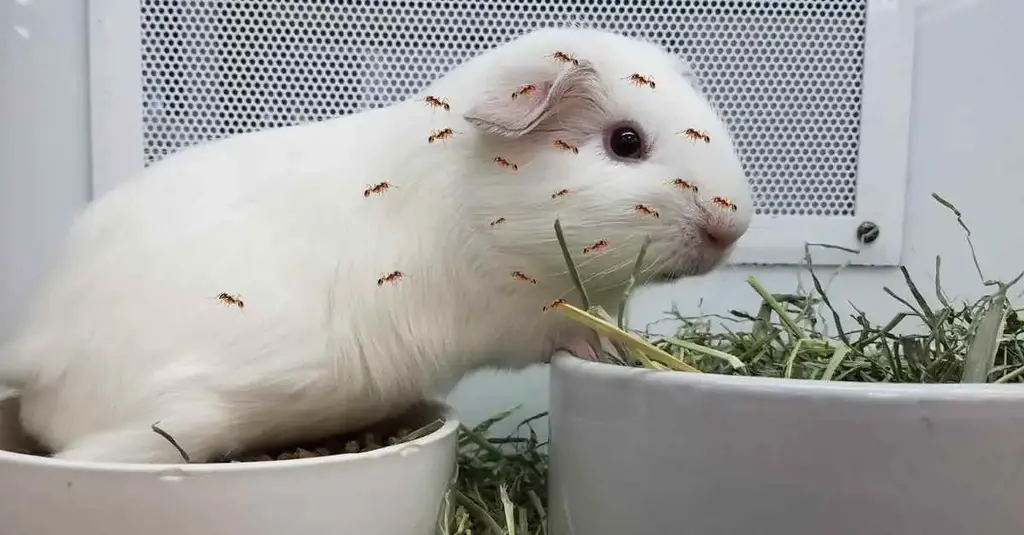
Frequently Asked Questions Of Can Ants Kill Guinea Pigs? This Is What You Should Know!
Are Ants Harmful To Guinea Pigs?
Ants can be harmful to guinea pigs because they can bite and cause pain or transmit diseases.
How Do I Keep Ants Off My Guinea Pig?
To keep ants off your guinea pig: – Clean the guinea pig’s living area regularly and remove any food crumbs. – Store guinea pig food in airtight containers to prevent attracting ants. – Use ant repellents or create barriers around the guinea pig’s cage or play area.
– Seal any cracks or openings to prevent ants from entering your home.
Do Ants Like Guinea Pigs?
Ants do not like guinea pigs; they do not show any interest in them.
Can Bugs Kill Guinea Pigs?
Bugs can potentially kill guinea pigs, so it’s important to keep them away.
Conclusion
It is crucial to be aware of the potential dangers that ants can pose to guinea pigs. While ants may not directly kill guinea pigs, their bites can cause a range of issues, including pain, discomfort, and allergic reactions. Additionally, ants can carry diseases and parasites that can be harmful to guinea pigs.
To protect your pets, it is essential to prevent ants from accessing their living areas by keeping the environment clean and free of food sources that may attract these pests. Regularly inspecting and treating the surroundings for ant infestations can also help ensure the well-being of your guinea pigs.
By taking these precautions, you can create a safe and secure space for your beloved guinea pigs, minimizing the risks associated with ants and promoting their overall health and happiness.

